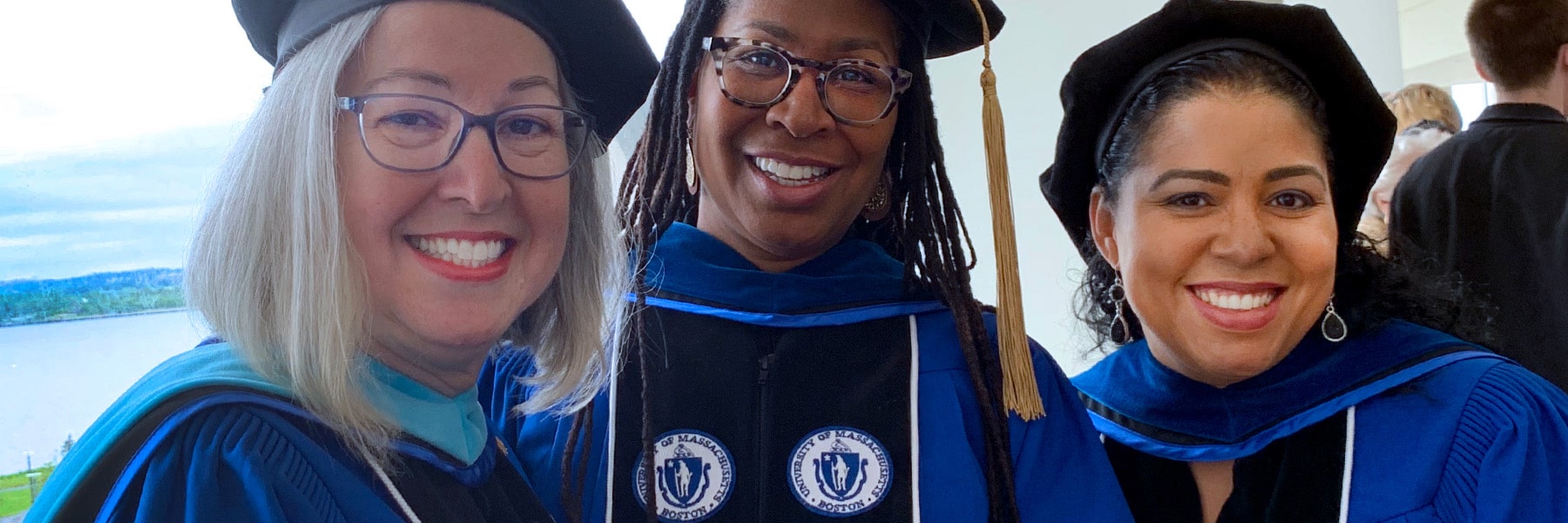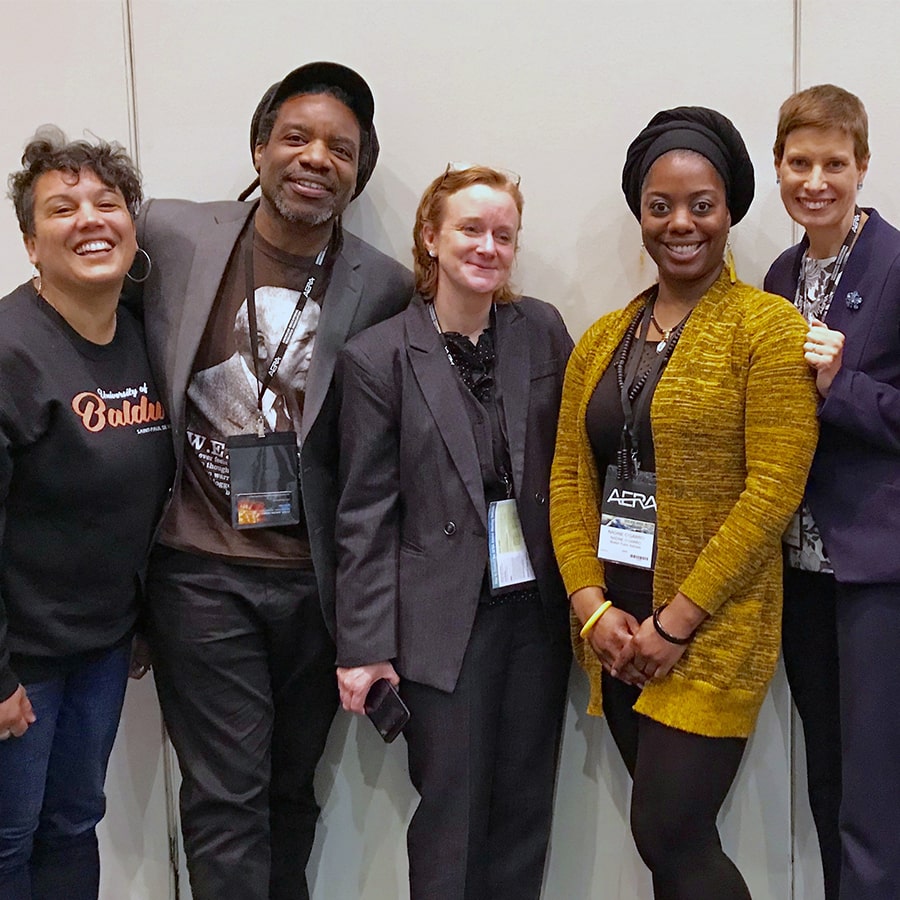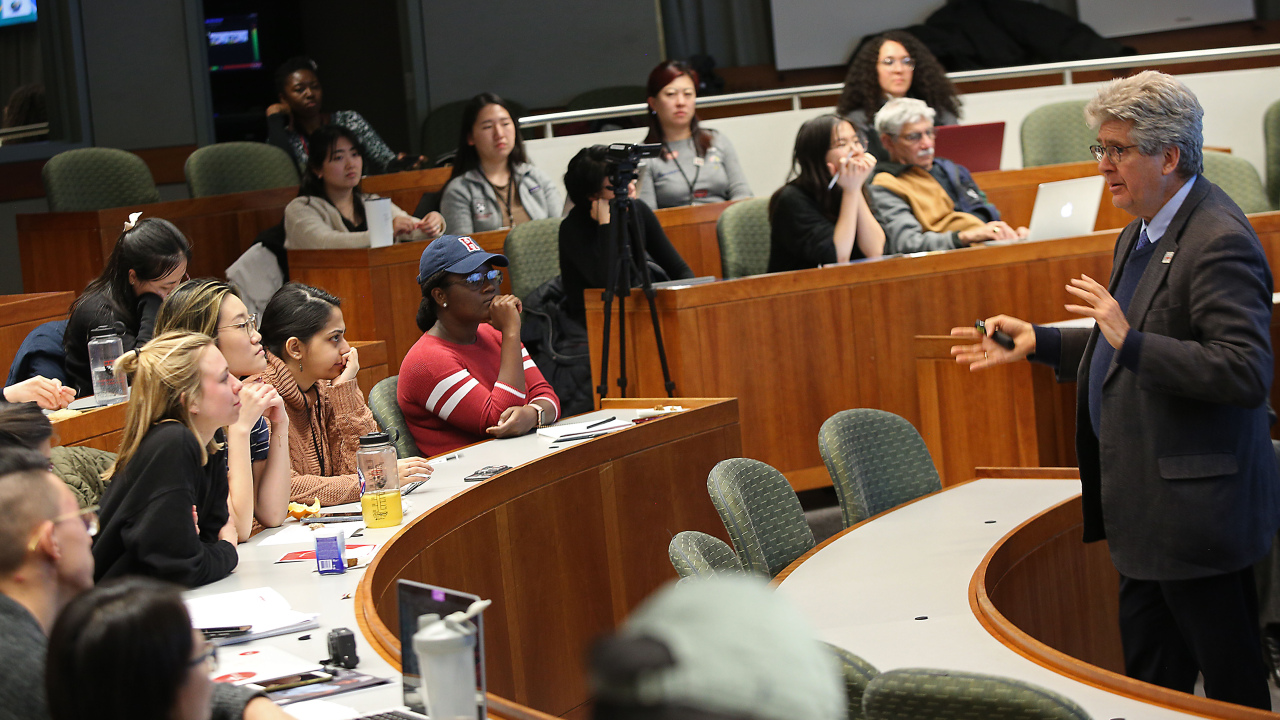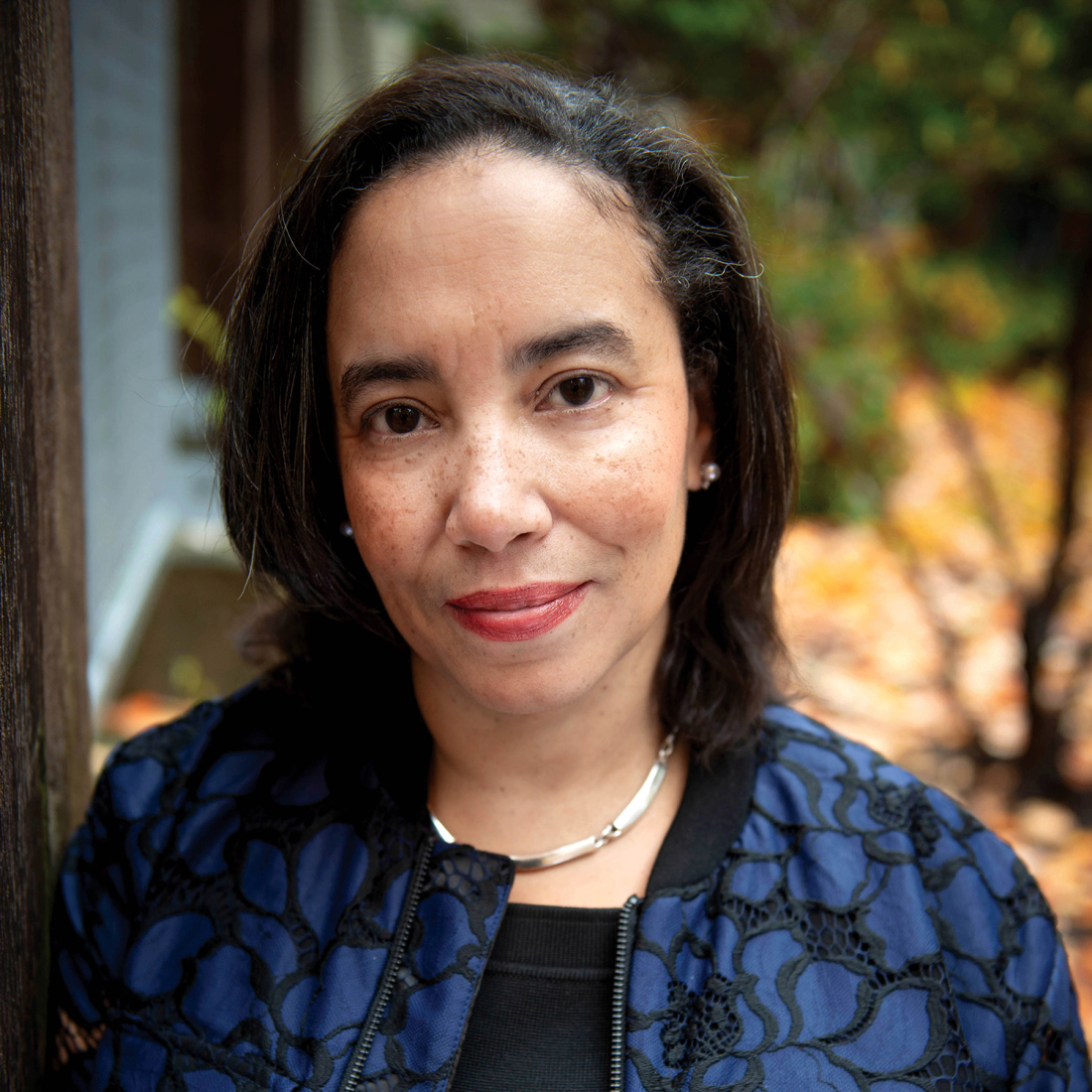Request Info
- Admissions Overview
- Visit UMass Boston
- Financial Aid
- First-Year Students
- Transfer Students
- Graduate Students
- International Students
- Academics Overview
- Majors & Programs
- Online & Continuing Education
- Colleges & Schools
- Academic Calendar
- Healey Library
- Global Programs
- Study Abroad
- Fellowships
- Campus Life Overview
- Student Groups & Activities
- Housing & Dining
- Health & Wellness
- Diversity & Inclusion
- Safety & Security
- Orientation & New Students
- Research Overview
- Community-Driven Research
- Recognizing Excellence
- Student Research
- Centers & Institutes
- Core Facilities
- Research & Sponsored Programs
- About Overview
- Leadership & Administration
- Mission & Vision
- Facts & Figures
- Accreditation & Rankings
- History of UMass Boston
- Student Consumer Information
- Athletics Overview
- Recreation at UMass Boston
- Current Students
- Parents & Families
- Faculty & Staff

UMass Boston

- Higher Education EdD / PhD
Developing scholar-practitioners who can bring about changes in colleges and universities to advance equity and racial justice.
The mission of the Higher Education Program (EdD/PhD) at UMass Boston is to develop scholar-practitioners who can, through their research, leadership, and educational practice, bring about changes in colleges and universities to advance equity and racial justice.
The Higher Education Program focuses on issues of concern to leaders in all types of higher education institutions, including community colleges and four-year institutions, both public and private. The curriculum covers topics such as organization and leadership, teaching and learning, college student development, diversity, public policy, institutional change, college access, equity, globalization, finance, and community engagement. Students also develop a strong foundation in both quantitative and qualitative research methods, as well as an understanding of the social and historical foundations of higher education.
Why Apply to UMass Boston's Higher Education EdD/PhD Program?
Founded in 1993, the Higher Education Program is one of the largest doctoral programs at UMass Boston. Six Higher Education scholars serve as full-time faculty in the program.
The Higher Education Program has an excellent track-record of graduating doctoral students and fostering their professional advancement. Here are a few highlights, based on our latest program review:
Retention and Degree Completion
- 87% retention and degree completion rate (the national average is 50%)
- 92% retention and degree completion rate for students of color
- 90% retention and degree completion rate for women
Professional Advancement
- 67% of students report they have been promoted at least once since joining the program
- 69% report they have been promoted at least once since earning their degree
- Students and alumni attribute these promotions to the knowledge and skills they gained in the program
Research Accomplishments of Program Graduates
- 57% have presented their dissertation research at academic conferences
- 55% have published at least one peer-reviewed journal article or book chapter
Start Your Application
Plan Your Education
Cohort model.
Each year, the program admits a cohort of between 10 to 12 students who take courses together throughout their program of study. The cohort model fosters collaborative approaches to learning, exploration, development, and problem solving. Through cohort development, students build strong peer-to-peer relationships that cultivate a vibrant learning environment founded in meaningful connection, active engagement, and a commitment to individual and group development. In the classroom, the cohort model fosters a learning environment in which students can establish meaningful connections to theory, research, and practice.
How to Apply
Applicants must meet general graduate admission requirements in addition to the following program-specific requirements:
- A bachelor’s degree from a regionally accredited U.S. institution of recognized standing or an international equivalent at the time of enrollment
- A minimum, cumulative GPA of 2.75 on a 4.0 scale (or international equivalent) in all undergraduate work
- A master's degree or the equivalent from a college or university of recognized standing
- Official transcripts for all institutions where you have earned more than 6 credits; if your transcript is in a language other than English, please include an English translation, validated by an official public translator
- Résumé or curriculum vitae
- Essay Applicants are asked to write an essay that addresses four areas: practice, preparation, leadership, and anticipated contributions to cohort-based learning. This essay should be approximately 2,000 words in length. Be sure to address the following areas:
- Reflect on your practice in higher education and how that practice relates to larger higher education issues.
- Reflect on your capabilities for leadership in higher education.
- Reflect on your preparation for doctoral-level work.
- Reflect on what you will contribute to the Higher Education Doctoral Program and what you will gain from it.
- Two (2) letters of recommendation Recommenders should have worked closely with the applicant in an academic, professional, or community service setting. Letters should not be written by friends or family members of the applicant and should focus on the applicant’s abilities and past academic performance. The letters should also assess the applicant’s level of motivation for and commitment to a leadership role in higher education. Former professors familiar with the applicant’s academic abilities could address the applicant’s capacity to perform graduate-level work. Supervisors or colleagues at the current place of employment could describe and give evidence of the applicant’s potential as an initiator and implementer of organizational change.
- Employer Agreement Form The Employer Agreement Form shows year-by-year how the applicant and their employer will arrange the applicant’s work schedule to permit the applicant to meet the program’s requirements. These include three June sessions and a full weekday (Friday) on campus each week during the semesters leading up to the dissertation seminars. Please upload the Employer Agreement Form to the Documents section in the GradCAS application.
- If applicable, request official TOEFL, IELTS, PTE and Duolingo scores to be sent to the University of Massachusetts Boston
All application materials should be sent directly to Graduate Admissions/GradCAS application. Do not send the materials to the Leadership in Education department office. Materials must be sent directly to admissions in order to be processed.
The admissions committee will interview all finalists before making its recommendations for acceptance into the program.
Deadlines & Cost
Deadlines: February 15 for summer
Application Fee: The nonrefundable application fee is $75. UMass Boston alumni and current students that plan to complete degree requirements prior to graduate enrollment can submit the application without paying the application fee.
Program Cost Information: Bursar's website
Curriculum - Higher Education EdD
Core courses (21 credits).
- HIGHED 601 - Educational Leadership Skills 3 Credit(s)
- HIGHED 610 - Administration and Governance in Higher Education 3 Credit(s)
- HIGHED 611 - Access and Equity in Higher Education 3 Credit(s)
- HIGHED 612 - Research on Students 3 Credit(s)
- HIGHED 620 - Teaching, Learning, and Curriculum in Urban Contexts 3 Credit(s)
- HIGHED 632 - Organization and Leadership in Educational Institutions 3 Credit(s)
- HIGHED 634 - Public Policy Issues in Higher Education 3 Credit(s)
Research Courses (15 Credits)
Please take the four classes below and an additional advanced research methods class chosen in consultation with your pre-dissertation advisor or dissertation committee chair.
- HIGHED 751 - Research Methods in Higher Education: Quantitative Analysis 3 Credit(s)
- HIGHED 752 - Research Methods in Higher Education: Qualitative Analysis 3 Credit(s)
- HIGHED 753 - Research Design in Higher Education 3 Credit(s)
- HIGHED 793 - Research Seminar on the Qualifying Paper 3 Credit(s)
Electives (3 Credits)
Complete one additional course chosen in consultation with your pre-dissertation advisor or dissertation committee chair.
Dissertation Seminars (6 Credits)
- HIGHED 891 - Dissertation Seminar 2-3 Credit(s)
- HIGHED 892 - Dissertation Seminar 3 Credit(s)
Dissertation Research (6 Credits)
- HIGHED 899 - Dissertation Research 3 Credit(s)
For more information on curriculum, including course descriptions and degree requirements, visit the Academic Catalog .
Curriculum - Higher Education PhD
Research courses (18 credits).
Complete the four courses below and two advanced research methods courses chosen in consultation with your pre-dissertation advisor or dissertation committee chair.
Electives (9 Credits)
Complete three courses chosen in consultation with your pre-dissertation advisor or dissertation committee chair.
Graduation Criteria
Higher education edd.
Complete 51 credits from 17 courses including eight core courses, five research courses, one elective, two dissertation seminars, and six credits of dissertation research.
Doctoral candidacy: Completion of a qualifying paper. Dissertation: Compose and defend a dissertation based on original research. Independent study: Students can enroll in up to four independent studies (3 credit hours each).
Transfer courses: Students can transfer a total of 12 credits: 6 from prior or concurrent coursework at other institutions and 6 from prior coursework at UMass Boston. No transfer coursework from other institutions or UMass Boston taken more than seven years before admission to the program will be accepted.
Statute of limitations: Seven years.
Higher Education PhD
Complete 60 credits from 20 courses including seven core courses, six research courses, three electives, two dissertation seminars, and six credits of dissertation research.
Doctoral candidacy: Completion of a qualifying paper. Dissertation: Compose and defend a dissertation based on original research Independent study: Students can enroll in up to four independent studies (3 credit hours each).
Transfer coursework: Students can transfer a total of 12 credits: 6 from prior or concurrent coursework at other institutions and 6 from prior coursework at UMass Boston. No transfer coursework from other institutions or UMass Boston taken more than seven years before admission to the program will be accepted.
Student Outcomes
Student success.
The success of our program is measured by the success of our students. The program review team highlighted the following: “the retention and graduation rate [of the Higher Education Doctoral Program] is well above national averages for all students and students of color, at 87.1% and 91.1%, respectively.
Students described how their participation in the program was already contributing to their professional advancement. Two-thirds of student survey respondents (34 of 51, 66.7%) indicated that they have received a job promotion since starting the program. In fact, 9 students (17.6%) reported that they have received two or more job promotions since starting the program. Furthermore, 75.6% of student survey respondents indicated that they have taken on increasing levels of responsibility in their job, since starting the program. The students attributed their job promotions and new responsibilities to the knowledge and skills that they gained in the program:
“My most recent promotion is directly attributable to the knowledge and skills that I have developed in the program. Specifically, the knowledge I gained about student success, university policy, and finances were key factors in my job interview and that led to this promotional opportunity.”
Educating Scholar-Practitioners
Students noted that the curriculum is relevant to their work as a practitioner. A total of 61.5% of student survey respondents strongly agreed with the statement that “the content in the program's required courses is relevant to my work as a higher education practitioner,” and 35.9% agreed with that statement. Only one student disagreed (fall 2016 survey). The survey of recent alumni demonstrated a similar level of agreement for this item: 58.3% strongly agree and 41.7% agree (fall 2016 survey).
Survey results showed that students find the curriculum to be highly relevant to higher education as a field of study. Current students noted that the program’s courses have enhanced their understanding of research and theory in the field of higher education; 77.5% strongly agreed and 22.5% agreed (fall 2016 survey).
The program is distinguished by five defining characteristics:
- The program serves experienced professionals who are committed to strengthening and expanding their capacities for leadership to advance equity and racial justice in higher education.
- The program contributes to increasing the racial and gender diversity of leaders in higher education and promotes critically conscious, equity-minded, and asset-based approaches to leadership.
- The program is structured through a cohort model, with cohorts comprised of students from a range of identities and experiences, who enter the program at the same time and take a series of courses together. The knowledge contributed and developed by cohort members serves as an important learning resource as students move forward through the coursework.
- The program prepares scholar-practitioners as educational leaders who can contribute to organizational change for equity and racial justice in higher education.
- The program emphasizes the development of equity-minded scholar-practitioners who can apply research and theory to issues of policy and practice, as well as contribute new knowledge to the field of higher education through their own research.
Graduate Program Director Jay Dee jay.dee [at] umb.edu (617) 287-7694

Leadership in Education
Learn more about UMass Boston's Leadership in Education department, our research, and our faculty.

College of Education & Human Development
Learn more about the faculty, research, and programs that make up our College of Education & Human Development.
Boston University Academics
Boston University
- Campus Life
- Schools & Colleges
- Degree Programs
- Search Academics
PhD in Educational Studies
For contact information, please visit the Wheelock College of Education & Human Development website .
The PhD degree program in Educational Studies at Boston University is designed for students who wish to contribute to the field’s understanding of teaching and learning through research.
The program will expand and deepen the knowledge and skills of enrolled graduate students in ways that will support their progress in pursuing teaching, research, and policymaking positions in public or private institutions of higher education. To do this, the program provides a deliberate course of study, including coursework in a specific content area, research, and active immersion in the community of student and faculty scholars within the program and throughout the college, the University, and the profession.
Doctoral students enrolled in the PhD in Educational Studies pursue one of four specializations:
- Educational Policy Studies
- Language and Literacy Education
- Mathematics and Science Education
- Special Education
Students work closely with Wheelock faculty as research, teaching, and/or graduate assistants as they work to augment their knowledge and skills through their coursework, residency, and research.
The minimum unit requirement for the PhD is 66 units.
Learning Outcomes
PhD students in Educational Studies will:
- Demonstrate both deep knowledge and understanding of a specific area in their field and the ability to use the knowledge to seek and find solutions to important educational problems.
- Demonstrate the research capacities (qualitative, quantitative, and mixed methods) needed to conduct original research while also demonstrating sufficient familiarity with other research methodologies to be able to critically read relevant literature in the field.
- Through research and scholarship, expand the theoretical and empirical knowledge base in their field to inform researchers, practitioners, and policymakers.
- Contribute to their field as highly effective teachers in a variety of educational contexts (e.g., colleges, universities, conferences, community meetings).
- Contribute to their field through service to educational and civic organizations that inform or implement policy, research, and practice.
Coursework and Other Requirements
Pro-seminars (8 units across two terms; completed in year 1) .
Students take a two-term pro-seminar (WED ED 800 and WED ED 801; each 4 units) designed to develop a common conceptual understanding of Schools, Educational Institutions, Communities, Educational Foundations, and Systems and Theories of Learning and Teaching, with Social Justice as a unifying theme throughout.
Research and Teaching Apprenticeships
- Each term, PhD students are required to engage in some combination of research and teaching apprenticeships up to 20 hours per week.
- When engaging as a Teaching Fellow or Instructor of Record, students register for WED CT 700 Teaching Apprenticeship; 0 units.
- When engaging in a research apprenticeship, students register for WED RS 799 Doctoral Research Apprenticeship; 0 units.
Research Courses (minimum: 20 units)
- WED RS 652 Qualitative Research Methods or equivalent (required)
- WED RS 653 Quantitative Research Methods or equivalent (required)
Three additional courses; options include the following, as well as other courses across Boston University and at consortium partners:
- CAS PS 711 Statistics in Psychology (I and II)
- WED LS 726 Discourse Analysis
- WED LS 801 Design-Based Research as Educational Inquiry, Part I
- WED LS 802 Design-Based Research as Educational Inquiry, Part II
- WED RS 654 Educational Inquiry and Proposal Writing
- WED RS 655 Mixed Methods Research
- WED RS 750 Advanced Research Seminar
- WED RS 752 Seminar in Qualitative Research
- WED RS 754 Causal Design in Education Research
Specialization Courses (minimum: 28 units)
Specialization courses are determined jointly between the student and doctoral advisor. Examples of options in each specialization area are listed below:
Qualifying Tasks
- One qualifying task comprises completion of an empirical study and associated research article intended for publication; topic and format to be determined in collaboration with the student’s advisor. Work will be evaluated by the student’s Qualifying Committee, and will be presented at a Doctoral Student Research Symposium.
- Completion of a literature review in an area of the student’s field of study where there is a problem/challenge/gap in the literature.
- Completion of a second empirical study and associated research article.
Dissertation Proposal
- Preparation of written proposal for dissertation research
- Oral defense of proposal to Dissertation Committee
Dissertation Advisement and Oral Defense (WED XX 999) (minimum: 10 units)
- Dissertation may take one of two forms: traditional or alternative format with three publishable articles
- Oral defense of dissertation findings to Dissertation Committee
Residency Requirement
Every doctoral candidate must spend a minimum of two consecutive terms in residence at Boston University. Residence is defined as registration for a minimum of 12 unit hours at the University during each of two consecutive terms. (Summer terms may be considered one term.) The residency requirement may be met by holding a research or teaching assistant position and registering for a minimum of 8 unit hours for two consecutive terms. For additional information, students should contact their academic advisors.
Related Bulletin Pages
- Abbreviations and Symbols
Beyond the Bulletin
- Wheelock College of Education & Human Development
- Wheelock Admissions
- BU Admissions
- BU Financial Assistance
- Applied Human Development
- Child Life & Family-Centered Care
- Curriculum & Teaching
- Deaf Studies
- Early Childhood
- Education & Human Development
- Educational Leadership & Policy Studies
- Educational Studies
- Education for Equity & Democracy
- Education for Equity & Social Justice
- Elementary Education
- English Education
- Language & Literacy Education
- Literacy Education
- Mathematics Education
- Science Education
- Social Studies Education
- Teaching English to Speakers of Other Languages
- World Language Education
- Minors in Education
- Graduate Studies
- Academic and Student Resources
- Licensure of Educator Personnel
Terms of Use
Note that this information may change at any time. Read the full terms of use .

related websites
Accreditation.
Boston University is accredited by the New England Commission of Higher Education (NECHE).

- © Copyright
- Mobile Version
- Explore UMass Programs
- Find a UMass Campus
- Affordability Calculator
- Student Outcomes
- Transfer Students
- Out-of-State Students
- International Students
- Request Info
- About the UMass System
- Quick Facts
- Affordability
- Tuition & Fees
- Why Massachusetts?
- President Meehan
- Employee Handbook
- Office of the President Website
- Support UMass
- Regional Alumni Events
- Industry Partnerships
- Core Research Facilities
- Workforce Development
- Entrepreneurship
- Press Releases
- Media Resources
- UMass Amherst
- UMass Boston
- UMass Dartmouth
- UMass Lowell
- UMass Global
- Program Finder
Higher Education
- share on Twitter
- share on Facebook
- share on Linkedin
- share via Email
The mission of the Higher Education program (PhD) at UMass Boston is to develop scholar-practitioners who can—through their research, leadership, and educational practice—bring about changes in colleges and universities to advance equity and racial justice. The Higher Education program focuses on issues of concern to leaders in all types of higher education institutions, including community colleges and four-year institutions, both public and private. The curriculum covers topics such as organization and leadership, teaching and learning, college student development, diversity, public policy, institutional change, college access, equity, globalization, finance, and community engagement. Students will also develop a strong foundation in both quantitative and qualitative research methods, as well as an understanding of the social and historical foundations of higher education. CIP Code: 13.0101
Possible Career Paths
Education Teachers, Postsecondary

The University of Massachusetts Boston is a nationally-ranked public research university known for its inclusive culture, student-centered teaching and deep connections to the booming economy and rich civic life of Boston. Nationally recognized as a model of excellence for urban public research universities, UMass Boston is the most diverse research university in the Northeast.
Learn to Change the World

What Impact Have High School Exit Exams Had in Massachusetts?
A new report investigates whether high-stakes graduation tests improve student achievement and long-term success

Teaching the Election in Politically Charged Times
Lecturer Eric Soto-Shed advises against avoiding classroom discussions on the upcoming U.S. election — and, instead, offers strategies on making these conversations worthwhile

The Politics of Reaching the Public
Senior Lecturer Joe Blatt’s Advancing the Public Understanding of Education: Election Edition encourages students to think like journalists

A Place to Thrive
Explore how you can connect, grow, deepen your work, and expand your horizons at the Harvard Graduate School of Education.
Degree Programs
Through a rich suite of courses and co-curricular experiences, along with the mentorship of exceptional faculty, a degree from Harvard Graduate School of Education prepares you to make a difference in education today.

Residential Master’s in Education
Immersive campus experience for aspiring and established educators, leaders, and innovators, with five distinct programs to choose from and rich opportunities to personalize your study and deepen your interests.
Online Master's in Education Leadership
Part-time, career-embedded program, delivered online, for experienced educators looking to advance their leadership in higher education or pre-K–12.
Doctor of Education Leadership
Preparing transformative leaders to have the capacity to guide complex organizations, navigate political environments, and create systemic change in the field of education.
Doctor of Philosophy in Education
Training cutting-edge researchers who work across disciplines, generate knowledge, and translate discoveries into transformative policy and practice.

Professional Development
For early childhood professionals.
Programs designed to support the learning and development of early childhood professionals working in diverse settings.
For K-12 Professionals
A robust portfolio of programs serving teachers, school leaders, district administrators, and other education professionals.
For Higher Education Professionals
Leadership and career development programs for college and university administrators.
Ideas and Impact
From world-class research to innovative ideas, our community of students, faculty, and alumni are transforming education today.

Students Are Feeling Burned Out. Here’s How You Can Help
The Center for Digital Thriving’s report on student burnout identifies pressures and ways to help limit their negative impact on teens

My Midlife-Crisis Master’s Degree
One current HGSE student writes on how she decided to go back to school

Do We Segregate Students on IEPs?
New book from alum says we do, but it doesn’t have to be that way
Faculty in the Media
With deep knowledge of the education field, HGSE faculty members influence current conversations in the media, giving educators and students a much-needed voice for positive change.

"There isn’t a sense of freedom to explore a liberal arts education when people are concerned about the economy. For people who are first-gen and people from low-income backgrounds, I want them to come into any college … and feel confident in taking courses that broadly expose them to ideas."
Higher Education PhD Program of Study
Minimum Credit Requirements for the Doctoral Program: 52 credits (42 credits from coursework and 10 from dissertation credits)
The Higher Education Graduate Student Handbook contains additional details about the program. Students who matriculated prior to Fall 2022, please refer to the 2021 Handbook for program of study requirements.
Summary of Credit Requirements
All doctoral students should complete the following at a minimum:
Core Higher Ed Courses (9 credits)
EDUC 643 Foundations of Higher Education* (3 credits) EDUC 644 Critical Perspectives on Equity and Justice in Higher Education (3 credits) EDUC 647B Principles & Practices of Student Affairs OR Higher Education Policy (3 credits)
Methods Courses (12 credits)
Quantitative Research Methods (6 credits) Qualitative Research Methods (3 credits) Additional Research Methods (3 credits)
Proseminar/Research Project (6 credits)
EDUC 717 Research in Higher Education (1-3 credits/semester)
Specialization Courses (15 credits)
Higher education doctoral students develop their programs of study in combination with their advisor and/or guidance committee, creating a set of goals and planning courses and experiences to meet these. Generally, however, the program of study for full-time students resembles the following:
Sample Full-Time Course of Study
Fall - year 1.
- EDUC 643 Foundations of Higher Education (3 credits)
- Elective/Specialization Course (3 credits)
- Research Methods Course (3 credits)
- EDUC 717 Research in Higher Ed (1 credit proseminar)
Spring - Year 1
- EDUC 644 Critical Perspectives on Equity and Justice in Higher Education (3 credits)
- Elective / Specialization Course (3 credits)
- EDUC 717 Research in Higher Ed (1 credit proseminar)
Fall - Year 2
Spring - year 2.
- EDUC 647B Higher Education Policy -OR- EDUC 621A Higher Education Finance Policy (3 credits)
- EDUC 717 Research in Higher Ed (3 credit class)
Fall - Year 3
- Elective/Specialization Course OR Research Methods Course (3 credits)
- Comprehensive Exam Preparation
Spring - Year 3
- Dissertation
Fall - Year 4
Spring - year 4 , sample part-time course of study.
- EDUC 717 Research in Higher Ed (three-credit class)
- Elective / Specialization Course (3 credits)
- Comprehensive exams
Comprehensive Exam
The comprehensive examination consists of two components: an applied research paper and two applied analysis papers in which you respond to questions you prepare with your committee. Together, these papers give you the opportunity to demonstrate mastery of the knowledge, skills and expertise necessary for conducting dissertation research in this multidisciplinary applied field. You will be required to demonstrate your knowledge of the research process as well as key issues and concepts in at least one major area of study within higher education.
Dissertation
Whereas the comprehensive exam allows you to demonstrate a breadth of knowledge about higher education, the dissertation is your opportunity to demonstrate depth of knowledge in one particular area of higher education. The dissertation is a highly individualized endeavor representing the area in which you will become an expert and generate new knowledge for the field. In close coordination with your dissertation adviser, you will design, execute, and report on a major research study. You will also form a three-person faculty committee to advise and validate this scholarly work. The process begins with your dissertation proposal, which your committee must approve. You’ll then conduct research, write the dissertation, and defend it before the committee.
Global footer
- ©2024 University of Massachusetts Amherst
- Site policies
- Non-discrimination notice
- Accessibility
- Terms of use

IMAGES
VIDEO
COMMENTS
The University of Massachusetts Amherst is the largest public research university in New England. With more than 28,000 students and over 200 distinct academic programs - including highly ranked programs in business, computer science, health care and the social sciences - UMass Amherst is one of the most comprehensive institutions in the Northeast.
Earning a PhD in Higher Education at the University of Massachusetts Amherst helps prepare graduates for careers as administrators, policymakers, researchers, and faculty members. ... Our doctoral program is research and writing intensive. You'll complete 42 credits of coursework and 10 dissertation credits. Along the way, you will develop a ...
Our graduates work within public and private schools, social service agencies, after-school programs, nonprofits, and shape public policy. Our curriculum is both global and local in scale, preparing graduates to take on vital roles as educators in Massachusetts and around the world. Explore our programs
Developing scholar-practitioners who can bring about changes in colleges and universities to advance equity and racial justice. The mission of the Higher Education Program (EdD/PhD) at UMass Boston is to develop scholar-practitioners who can, through their research, leadership, and educational practice, bring about changes in colleges and universities to advance equity and racial justice.
Earning a PhD focused on higher education at UMass Amherst helps prepare graduates for careers as administrators, policymakers, researchers, and faculty members. Most importantly, our emphasis on scholarly practice helps graduates support student success through evidence-based policies and interventions as well as rigorous empirical research.
The program will expand and deepen the knowledge and skills of enrolled graduate students in ways that will support their progress in pursuing teaching, research, and policymaking positions in public or private institutions of higher education. To do this, the program provides a deliberate course of study, including coursework in a specific ...
The mission of the Higher Education program (PhD) at UMass Boston is to develop scholar-practitioners who can—through their research, leadership, and educational practice—bring about changes in colleges and universities to advance equity and racial justice. ... The University of Massachusetts Boston is a nationally-ranked public research ...
The Ed.L.D. curriculum is a balance of multidisciplinary coursework and practice-based learning. Core courses and electives are taught by recognized leaders from across Harvard's graduate programs in fields like data-based education reform, organizational change and innovation, and effective leadership strategies for urban schools.
The mission of the Harvard Graduate School of Education is to prepare education leaders and innovators who will change the world by expanding opportunities and outcomes for learners everywhere. We're an institution committed to making the broadest impact possible, putting powerful ideas and evidence-based research into practice.
The Higher Education Graduate Student Handbook contains additional details about the program. Students who matriculated prior to Fall 2022, please refer to the 2021 Handbook for program of study requirements. Summary of Credit Requirements. All doctoral students should complete the following at a minimum: Core Higher Ed Courses (9 credits)